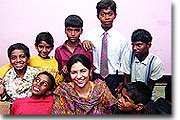
In Sector 8 Vikas Nagar, house number 212, “Gharaunda”, is home to eighteen little boys who have progressed from being homeless street kids on the railway station to being students at the local Rani Laxmi Bai school. It has all happened under the loving care of Shachi Singh and her NGO “Ehsaas”. These children have finally found a home where they can sleep, eat and study without the fear of being exploited or locked up behind bars. More than a home, these children have found love. “Everyone can survive, it’s not too difficult, but what a child needs most is love”, says the gentle woman whom they all call “Didi ji”.
Seven year old Aman is one of these children, he’s just come back from school and sits down on the floor with his didi ji to tell her all about the day, “All the teachers were present today! And Rohit and I played on the swings too! Didi ji when are you putting a swing in the park?” he babbles away as she keeps answering his questions. “Aman was on the railway station, his father doesn’t want him back, he’s remarried,” says Shachi who remembers how he used to live in a make believe world, “He picked up the phone and had an imaginary conversation with his father once. There was a time when he used to tell the other boys about how much his father loves him and how soon he’ll be coming to take him back. All that’s changed now”. Aman busies himself with drawing, while other little children trickle in. Each with a more painful history than the first. Relating a story brings tears to Shachi’s eyes, “I can’t help it, in this field, you cry everyday”.
It was while visiting relatives in old Kaiserbagh, the then eleven year old Shachi heard a voice that continues to haunt her, “I remember his voice, he was crying and the sobs were unbearable. He was asking someone, bachon ko kaam kyun karna hota hai? Mai kaam pe nahin jaaoonga! And he kept howling, I never saw his face, it was too dark”, after a minute of silence she says, “I still haven’t found the answer”. Shachi had always been a sensitive child, teaching the milkman’s son, the neighbor’s servant and anyone she could find who needed help. “I have been teaching children since I was in the 7th grade, I’d divide them into groups according to age and it was through trial and error that I learnt”, says this lady who decided this was her true calling. “A woman cannot afford to be fickle, no one takes you for granted if you know what you want to do, my parents always encouraged me and after marriage so does my husband, nothing has changed”.
She began working “in the field” on a project to teach children at the railway station, “The first day, I caught one child and told him I’d hold classes here on the platform. The news traveled and I gathered students by asking each one to bring another, eventually our group was teaching children regularly on the platform”. Shachi was disillusioned when the group of workers scattered as the resources ran dry, “It dawned on me that this sort of work finds takers only till there’s money, short term benefits. I couldn’t accept this”, she says. It was then that Ehsaas was formed in 2001. “I was given a room right next to the railway station where I taught these children the basics, how to sit, eat, talk, personal hygine, everything! The girls were the most miserable… exploited, sick and each worse than the other. The children had drug problems and even though they were street smart, they wanted love”, she says. Soon experts started coming in to help teach kids about children’s rights and diseases etc. “We had almost 400 children coming to us from surrounding areas as well” Shachi remembers. “The other day, one of my boys called me on Diwali, he’s in
The children at Gharaunda are all between the ages of 6 to 18, a double storeyed house right opposite a park in Vikas Nagar, “I wanted these children to learn to live with people they will meet everyday, to play with other children and feel as normal as they can. This is their home not an institution.” There are three bedrooms for the boys, divided according to their age. “For winter this year, we need mattresses and winter uniforms…I have faith in God that something will come about, it always does”, she hopes. The children sleep on daris and wear clothes that have been handed down by Shachi’s friends, friends of friends and so on. “Help is always needed, if someone can be a mentor to these children, help them with studies and love them…even if that someone comes once a week, it will be such a help”.
On the door outside Gharaundaa is a little message written by a twelve year old Deepak, each line a different colour reads-
“Pal, pal se banta hai ehasaas
Ehasaas se banta hai vishvaas
Vishwaas se bante hain Rishte
Rishton se bante hain kuch khaas..jaise aap”. The message was a surprise for his didiji on her birthday..


